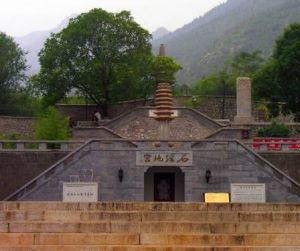Yunju Temple
The Yunju (or Cloud Dwelling) Temple, also known as Xiyusi (Temple of West Valley), is situated inside a limestone cave, south of the Shangfang Mountains to the southwest of Beijing, about 75 km from the city center. Two bone fragments found at the site were said to belong to Siddhartha Gautama, Buddhism's founder.
The temple is famous not for its buildings, but for its stone Buddhist scriptures. In the caves and under the pagoda to the south of the temple, lie buried 14,278 stone slabs inscribed with Buddhist scriptures with a history of a thousand years. It is probably the most important temple in the world for housing stone slab religious scriptures.
Buddhism was abolished twice by the emperors of the Northern Wei and Northern Zhou dynasties in 446 and 574, and a monk called Huisi decided to carve the Buddhist scriptures on stone slabs and bury them in caves (Buddhist scriptures were written on silk or skins which were easily destroyed). Monk Jingwan carried on his master's will and started to dig caves in the hill to house the stone scriptures. For over 30 years from the beginning of the 7th century to 637, he never stopped carving the stones. The stone scriptures were housed in caves, and when one cave was full it was blocked by huge stones and sealed with melted iron. After his death, his disciples continued his work until the 17th century. Altogether more than 1,000 volumes of Buddhist scriptures were carved, and the extant 14,278 pieces have now become state treasures. All the stone scripture slabs are kept in an exhibition hall built in 1980 in the temple.
